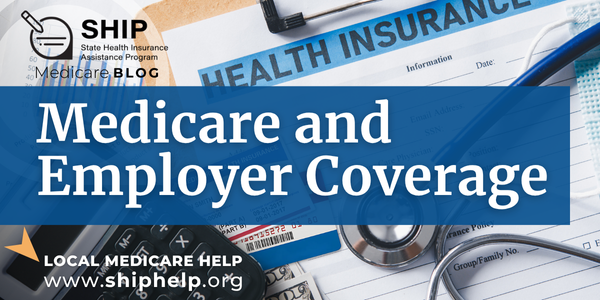When you have Medicare and another type of insurance, Medicare will either pay primary or secondary for your medical costs.
- Primary insurance pays first for your medical bills.
- Secondary insurance pays after your primary insurance.
Usually, secondary insurance pays some or all of the costs left after your primary insurance pays. For example, secondary insurance may help you pay for the copays you owe after your primary insurance pays.
Job-based insurance
Job-based insurance is coverage you have from your, your spouse’s, and sometimes your family member’s current work.
If you’re eligible for Medicare because you’re age 65 or older:
- Job-based insurance is primary if it’s from an employer with 20 or more employees. Medicare is secondary.
- Job-based insurance is secondary if it’s from an employer with fewer than 20 employees. Medicare is primary.
These rules are different if you’re eligible for Medicare due to disability:
- Job-based insurance is primary if it’s from an employer with 100 or more employees. Medicare is secondary.
- Job-based insurance is secondary if it’s from an employer with fewer than 100 employees. Medicare is primary.
If your job-based insurance is primary, you may decide to delay Medicare enrollment. In this case, you already have primary coverage. Plus, you may not want to pay the additional monthly Part B premium.
If your job-based insurance is secondary, you should enroll in Medicare Part B when you’re eligible. In this case, your job-based coverage may provide little or no coverage if you aren’t enrolled in Part B. Not having Part B would leave you with high costs for your care.
If you’re covered by insurance from your or your spouse’s current work, you have a Special Enrollment Period (SEP) to enroll in Part B. You can use the SEP while you’re covered by job-based insurance and up to eight months after the job ends.
Speak with your employer or benefits coordinator if you have questions about your employer coverage and how it works with Medicare. When you are ready to enroll in Medicare, you will do so through the Social Security Administration (SSA). If you’re using the Part B SEP, you’ll also likely need help from your employer.
Retiree and COBRA coverage
Retiree insurance is health coverage an employer provides to former employees. Retiree coverage almost always pays second to Medicare. This means you need to enroll in Medicare to be fully covered.
COBRA is a federal law that extends the option to purchase coverage to employees and their spouses or dependents once the employee leaves the job or loses coverage for other reasons.
- If you have COBRA coverage when you become Medicare-eligible, COBRA coverage usually ends the day you get Medicare. You should enroll in Part B right away. First, because COBRA is secondary to Medicare. Second, because you don’t get a Part B SEP when COBRA ends.
- If you have Medicare Part A or Part B when you become eligible for COBRA, you must be allowed to enroll in COBRA.
You don’t have a Part B SEP while or after you are covered by retiree or COBRA coverage. However, the first eight months of retiree or COBRA coverage often coincide with the eight months of the Part B SEP for job-based insurance. These eight months extend after the end of job-based insurance.
Protect your Medicare number
Medical identity theft can happen when someone steals or talks you into giving them your personal information, such as your name and Medicare number, to get medical treatment or products and bills your insurance for it. It is important to protect your Medicare number and only share it with trusted individuals because it can affect your medical, health, or financial records.
You should report medical identity theft if:
- You gave out your Medicare number over the phone or internet to someone offering a ‘NEW’ Medicare card, durable medical equipment, genetic/dementia testing, cancer screening, or back braces.
- You are contacted by a debt collection company for a provider bill you do not owe.
- You received boxes of braces, testing kits, or other medical supplies in the mail that you did not request or need.
- You were denied coverage, services, or benefits because of a medical condition you do not have
Call your Senior Medicare Patrol (SMP) if you have experienced potential fraud, errors, or abuse.
Still have questions?
Your SHIP is here for you! You can contact your SHIP for any Medicare-related questions or concerns you have. SHIP counselors are government funded to provide trusted, unbiased Medicare counseling at no cost to you. (Depending on your state, your SHIP may go by another name.) Use our online SHIP Locator or call 877-839-2675 (and say Medicare
when prompted) to find your local SHIP.
If you think you have experienced potential Medicare fraud, errors, or abuse, contact your local Senior Medicare Patrol using the online SMP Locator or by calling 877-808-2468.

